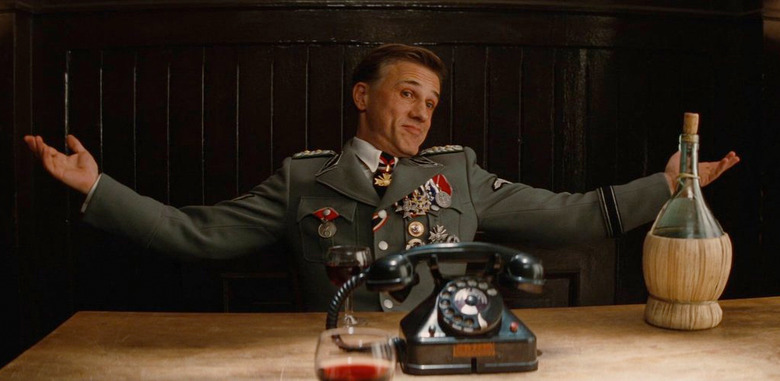Quentin Tarantino Wouldn't Let Christoph Waltz Rehearse With The 'Inglourious Basterds' Cast
There's a case to be made (we have, in fact, made it) that Inglourious Basterds is Quentin Tarantino's best film. A big part of what makes the movie work is Christoph Waltz's Oscar-winning turn as the villainous Hans Landa. At one point, Tarantino himself said, "Landa is the best character I've ever written and maybe the best I ever will write."
When the movie went into production, however, Waltz was still a relative unknown. Even his co-stars didn't know who he was. Tarantino apparently used that to his advantage, wielding Waltz like a secret weapon and not letting him rehearse with Brad Pitt or most of the other cast members.
Tarantino recently appeared on The Moment podcast (via IndieWire), where he revealed his pool-shark approach to having Waltz interact with his Inglourious Basterds castmates. Before the first script reading, he apparently asked Waltz to withhold the full force of his acting talent:
"I got together with Christoph before we got to the big script reading with the cast. I told him, 'I'm not doing this to be perverse game playing ... everybody is so curious about who is playing Hans Landa. I don't want you to be bad at the script reading, but I want you to hold a lot back. I do not want them to think that they are getting a glimpse of who you are really going to be. On a scale of one to 10, be a six. Be good enough, just good enough. I do not want you to be in a competition with anybody, and if you are in competition then lose. I don't want them to know what you have or for them to have a handle on Landa."
Tarantino's Secret Weapon: A Polyglot
After the script reading, Tarantino asked Waltz not to rehearse with Pitt, Diane Kruger, or the rest of the Inglourious Basterds cast, saying he didn't want them to know Waltz's "gun-slinging abilities" until the cameras were rolling. Instead, he personally rehearsed with Waltz. The only exception he made was for Denis Ménochet, the French actor who played the farmer, Perrier LaPadite, in the opening chapter, "Once Upon a Time in Nazi-Occupied France."
This approach worked: Landa keeps the other characters off-balance and "dominates" his scenes, as Tarantino himself notes. One such scene occurs in the lobby of Le Gamaar Cinema, where Landa slips effortlessly into Italian, thereby challenging the Basterds, who are impersonating an Italian film crew. Dialogue is an important feature of Tarantino's films and having an actor who speaks multiple languages (Waltz is a polyglot who is fluent in German, English, and French) maneuver between them and spout quotable lines created the perfect marriage between actor and script.
For understandable reasons, Tarantino's relationship with Uma Thurman was left strained after Kill Bill, and in her absence, Waltz became his new muse. Until Brad Pitt won Best Supporting Actor last year for his role as Cliff Booth in Once Upon a Time in Hollywood, Waltz was actually the only Tarantino actor to ever win an Oscar. He did it twice, no less: the second time being for Django Unchained.
There's a lesson here, kids: keep studying foreign languages. You never know when they could help you win an Oscar.

